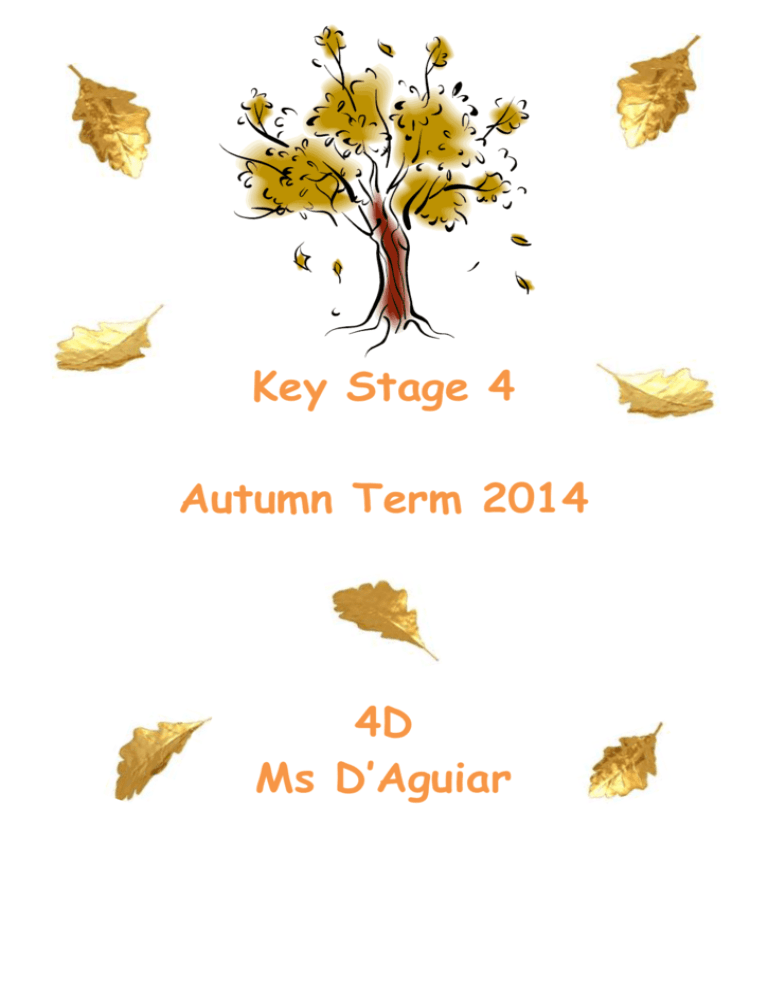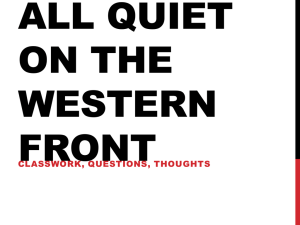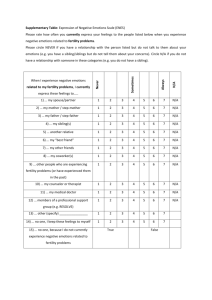Key Stage 4 Autumn Term 2014 4D Ms D`Aguiar
advertisement

Key Stage 4 Autumn Term 2014 4D Ms D’Aguiar English Teacher: Mrs Richards Topic: Classic Texts– Oliver Twist by Charles Dickens Skills students will be developing: Fine motor skills and handwriting. Reading skills, including comprehension. Speaking and listening skills, including role play and discussion. Imaginative writing. Working as part of a group / in pairs / turn-taking. Brief description of activities: Learning about the life of Charles Dickens: when and where he lived, what he did. Learning about the rich poor divide and the Victorian workhouse. Reading a simplified version of ‘Oliver Twist’ by Charles Dickens. Creating character profiles of Oliver, Fagin, Mr Bumble. Dramatising sections of the story. Making gruel. Ordering events in the story. Responding imaginatively to the story through monologues, wanted poster, missing person poster. Answering comprehension questions related to the story. Subject vocabulary: Charles Dickens, author, fiction, story, Oliver, orphan, gruel, workhouse, cruel, cruelty, kindness, city, pickpocket, apprentice. Maths Skills students will be developing: Students will develop their numeracy skills including number sequencing, counting and counting out amounts, addition and subtraction and fractions. Students will develop their awareness of time and ability to sequence activities and routines Students will develop skills to repeat and continue a repeating pattern Students will sort and compare objects by height and length Brief Description of Activities: Our topics this term are number, time, measurement and pattern In the first half of term students will have weekly sessions focusing on individually differentiated numeracy work. A weekly session on developing understanding of time in the first half of the term where students will sequence activities and daily routines. In the second half of term student will have a weekly session continuing on developing numeracy skills. In the second half of term students will have a weekly session comparing a range of objects using terms big, little, short, tall and long. Students will use a range of objects to copy and continue repeating patterns Subject vocabulary: First, next, last, long, short, tall, big, little, more, less, one, lots, pattern, time, clock, before, after, numbers and colours ICT Topic: Multimedia Documents Skills students will be developing: Creating PowerPoint Presentation for a given audience Website Design Game Making using Game Maker/Scratch Brief description of activities: Creating documents for a given audience using a range of tools to enhance their presentation and presenting it to their peer group Creating a website on a topic of their choice following a web design. Students will use a range of features such as inserting hyperlinks, creating buttons, inserting images, inserting video (if applicable) and using a range of formatting techniques to enhance the overall appearance of the website. Students will be given the opportunity to create a game using either Game Maker or Scratch. Students will be shown how to create sprites (characters), objects and events to make their games. Subject vocabulary: Scratch, Game Maker, Objects, Sprites, Events, Actions, grid, animations, images, formatting, buttons, plans, effects, hyperlinks, audience. Science Materials (Colours/smells & fibres) Skills students will be developing: Developing an understanding of the different properties of materials Developing ways to investigate different materials Use of keywords to describe scientific phenomenon. Brief Description of Activities: Investigating different objects and using keywords to describe them. Students will make their own paint from ingredients Students will make their own perfume from ingredients Students will look at a range of fabrics and investigate the properties Students will build a house from different materials and test for strength Subject vocabulary: Paint, pigment, waterproof, perfume, ingredients, Materials, waterproof, stretchy, strong, shiny, hard, soft, transparent, wood, plastic, metal, cotton, nylon, wool. PSHE/C Topic: Healthy Lifestyles/Emotions Teacher: Ms C. De Aguiar Skills students will be developing: The skill to recognise the characteristics of certain emotions/feelings in themselves and others. The difference between positive and negative emotions/feelings. Strategies to cope when they or people around them feel a negative emotion. Brief Description of Activities: Students will participate in; Use images/videos to identify emotions and explain reasons and causes of emotions. Using images/videos/role to demonstrate how people might communicate emotions; inappropriate and appropriate methods of communicating emotions. Engage in games and role play to demonstrate ways people display emotions/feelings. Use role-play and visuals to developing coping strategies; what should I do when I feel.....? Subject vocabulary: Emotions, feelings positive, negative, natural, rational, irrational, emotional intelligence and strategy. R.E. Belonging Teacher: Miss McKenzie Skills students will be developing: An understanding of what groups they belong to. Students will recognise that ‘belonging’ is a positive feeling. An understanding of baptismal rites. An understanding of how Christian’s are welcomed into God’s family. Brief Description of Activities: Students will; Create a family tree to find where they belong. Sequence the Journey of life. Role play and learn the steps of a Baptism. Role play and learn the steps of a Confirmation. Subject vocabulary: Family, Life, Belong, Baptism, Confirmation. P.E. P.E.: Touch Rugby Skills/ Swimming/ Cycling Teacher: Ms Donaldson OT Support: Julia Beech Skills students will be developing: Ability to play and interact with the group and be part of a team. Ability to wait, share and take turns. Explore and use basic ball skills individually and in combination. Water confidence and safety in the pool. Stroke technique on front and back. An ability to recognise and describe how their bodies feel during exercise. An ability to recognise good performance. Learning rules to use the cycle track safely. Increase confidence on a bike/tricycle relevant to their individual levels. Begin to learn to use cycle safely with consideration of others. Brief description of activities: Individual, partner, group ball control, dribbling, passing, shooting practices. Passing skill practices in pairs and small groups. Relays, competitions to develop speed and control. Conditioned games to help learn the rules of football leading to basic games. Water confidence activities Activities to develop the use arms + legs to propel themselves. Work on technique to on their front + back developing correct strokes. Basic bike related activities to improve skills such as steering, pedalling, braking. Subject vocabulary: key words associated with touch rugby e.g. team, try, pass, kick, tackle. key words associated with fitness, e.g. heart, lungs, endurance, speed, flexibility, strength, reaction time. Key words associated with cycling e.g. pedal, brake, helmet, steering. Textiles Teacher: Claudette De Aguiar Skills students will be developing: Show awareness of the vocational area. Interact with others in an appropriate way. Show a development in textile skills. Brief Description of Activities: Experiencing design. Identify appropriate equipment for set tasks; recognise basic tools and fabric requirements for each project Demonstrate awareness of correct (safe) use of equipment, for example, scissors, templates, fabrics, needles, sewing machine, pins. Communicate with peers and tutors. Demonstrate ability to work effectively individually or with a partner Identify suitable fabrics and threads. Identify equipment to be used. Identify appropriate decorative techniques used in textiles. Subject vocabulary: Sew, needle, sewing machine, tack, scissors, thread, and tape measure, calico. Projects: P.E. Bags, pencil case, Christmas ornaments. ASDAN – Mini Enterprise Introduction to Enterprise Teacher: Anushka Arora Skills students will be developing: Awareness of the world of work Knowledge of jobs performed in a small enterprise Research and vote for enterprise name Creativity skills for advertising Demonstrate at least 2 jobs performed in a small enterprise Communication skills with peers and staff Working in a Team. Brief description of activities: Design posters for advertising Research names for our enterprise Identify skills required to work in an enterprise Take part in role plays to become familiar with jobs in an enterprise Keep a record of appointment on a weekly basis Greet and welcome customers Demonstrate appropriate use of products Make products ready for Sale event. Subject vocabulary: Enterprise, skills, jobs, world of work, posters, advertise, appointment, services, products, meet and greet. Social Skills Social Skills Therapy Sessions Speech & Language Therapists: Caroline Lacey and Neera Kavia Speech & Language Therapy Assistant: Reshma George Skills students will be developing: Awareness of emotions Attention and Listening skills Vocabulary related to Interacting with peers and adults within School Environment Social interaction with peers Functional Communication Skills (from smiLE Therapy programme) Social Communication skills from Talkabout Social Commnication Skills package (A. Kelly) Brief description of activities: Observing and taking part in role plays to do with appropriate interactions within a School Environment Interactive White Board activities including watching videos Videoing students and evaluations by students Vocabulary: Different greetings and conversation openers, vocabulary to do with feelings and emotions. GEARZ School and VBC Link Course Vocational Co-ordinator: Netta Hill GEARZ (SKIDZ) is based at West Drayton Youth Centre and offers our students opportunities in developing skills and understanding in the maintenance aspects of the motor vehicle trade, these include; health and safety in the work place, basic motor mechanics, safe use of tools and equipment and basic valeting. Along with the development of work based skills students are given the opportunity in acquiring the skills necessary for moving away from the school environment and encouraged to take more responsibility and learn new routines. Students who attend this link course will be working with specialist tutors and supported by Pield Heath Staff. Students will also be given the opportunity in gaining some accreditation. Subject vocabulary: Workshop, Health and Safety, Team Work, Lockers, Overalls, Boots, Axel Stand, Jack, Torque, Wrench, Bonnet, Boot, Torch, Engine







